How Designers Are Catering to Those Who Love Juuls and Vaping
Another widespread social development, another fashion opportunity.
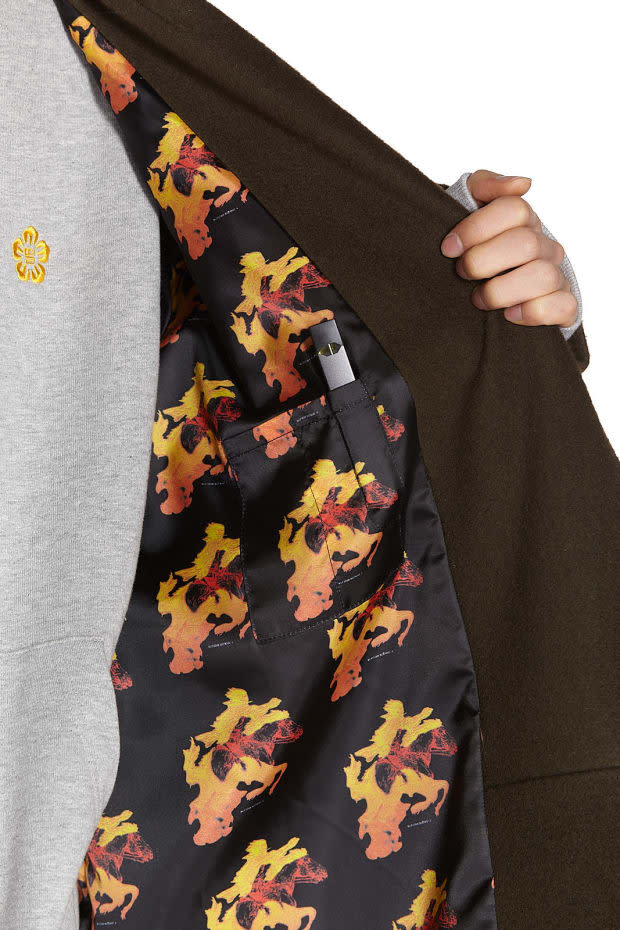
If 2018 was considered the year of the Juul, then 2019 is the year of stylishly concealing it — whether that involves a perfectly-sized pouch on a designer handbag, an inside pocket of a menswear coat or an 18-karat gold with a personalized monogram to encase it. There's also the option to make the nondescript e-cigarette stand out. Currently on Etsy, one could browse more than 1,200 skins to wrap and customize a Juul, from logomania motifs to trendy marble print or glitter. The sleek, monochrome e-cigarette can even transform into a branded Supreme x Louis Vuitton piece (bootleg, of course) if you search Amazon well enough.
"There's this whole sort of individuality, DIY aspect to Juuling because they're so innocuous," says Brian Trunzo, a senior consultant at WGSN. "You really do need to either mark your Juul or provide an accessory so you don't lose it or have it stolen from you at a party or bar. Tapping into people's desire to showcase their own individuality just makes complete sense."
For Dae Lim, who launched his smokewear label Sundae School in 2017, adding "Vape Star" pockets to his upcoming Fall 2019 collection was mostly driven by easy accessibility. The small slots, which took multiple iterations to fit a Juul just so, can be found on the sleeve of a hoodie, the inside lining of a coat or on the chest of a jacket. The brand's signature caps, which feature a loop that can seamlessly hold a rolled joint, are now resized to carry a Juul or vape.
Though Sundae School is always focused on the experience of recreational cannabis consumption, the Juul — a device that traditionally uses pods containing the highly addictive ingredient nicotine — still served as one of Lim's inspirations, as he recognized that more people are starting to smoke THC and cannabis through the popular e-cigarette.
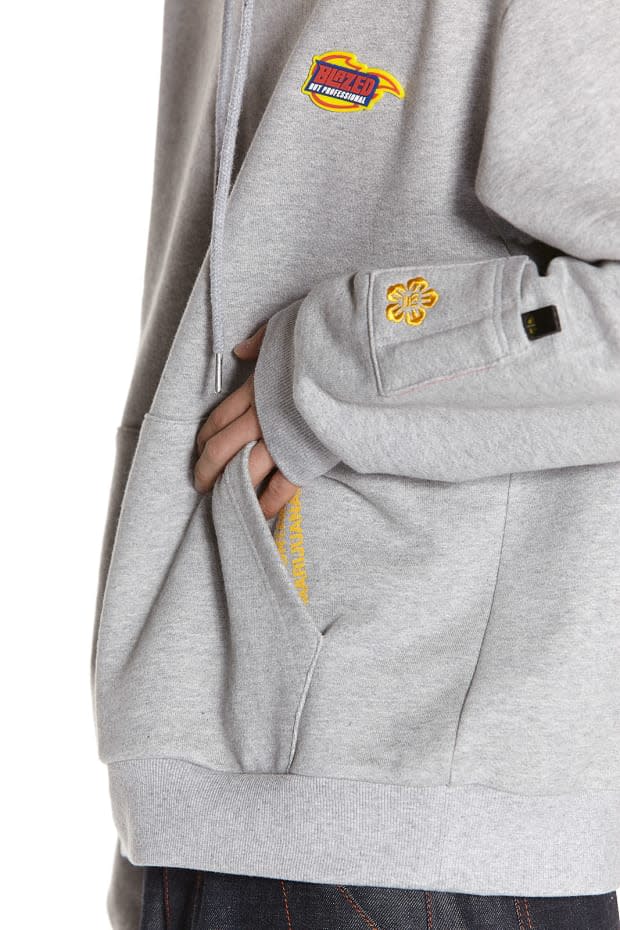
"When we design, we always think about designing for modern-day stoners," says Lim. "We know that immediacy is key for our generation, so we placed these pockets, whether it's on the chest or the sleeve, while really thinking about the convenience."
Lim joins a handful of brands that are offering product that caters to those who love to Juul, vape or smoke e-cigarettes — a market that the Silicon Valley-based startup actually dominates by more than 70 percent in the U.S. Over the past two years, a Juul has become the accessory du jour not only among Cool Teens? but also the fashion set — showcased in editorials, featured in plenty of influencers' Instagram posts and spotted both backstage and in the front row during fashion week. (Never forget Diet Prada's #vuittonvapegirl drama.)
During London Fashion Week in September 2018, Henry Holland introduced a collaboration with Vype, a U.K.-based e-cigarette brand not unlike Juul, for Spring 2019. Models walked down the runway with House of Holland accessories — a neck pouch, handbag and body harness — that could hold Vype's e-pen 3, which also featured vape skins emblazoned with the collection's limited-edition logo prints from New York-based artist Andrew Brischler.
"What really appealed to me about the product is you have the increasing popularity of vaping and it's about creating things that enhance or create excitement within people's everyday lives and within their wardrobes," said Holland in a promotional video for Vype. (Throughout his career, the designer has created plenty of items outside of the fashion realm, including surfboards, furniture and even chewing gum packaging.)
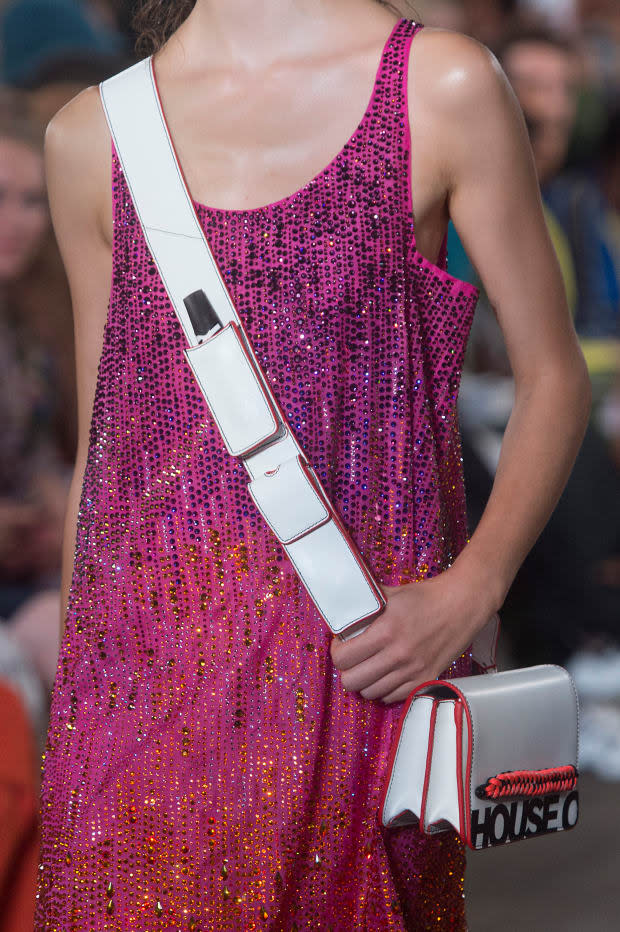
Accessory brands, especially, have released their own Juul-inspired creations over the past year. Brooklyn-based designer Lizz Jardim of L. Jardim released a magnetic Juul case that features a D-ring on the back to prevent the mouthpiece from being placed in direct contact with dirty surfaces. "It's a little absurd, but I think that's also what's fun about it," says Jardim. "In creating these niche accessories, these objects become available to people who perhaps aren't as interested in or comfortable with other traditional forms of adornment like body jewelry. It's not so much a gimmick or attempt to tap into a specific market, but more about an approach towards design that aims to be both beautiful and functional."
Britt Bolton, who's also from Brooklyn, created a wallet chain Juul case that's exclusively available at Opening Ceremony. The idea came up during a sales meeting with the fashion-forward retailer's buying team, the designer said in an interview with Flaunt. "They were looking at my new pieces, like the lighter case, and my sales rep asked about making a Juul case. The buyer at Opening Ceremony had a Juul and loved the idea," recalled Bolton.
Luxury label to watch Ratio et Motus has made waves for its street-style-friendly handbags, as well as its "Disco" bag — a mini crossbody or belt bag that features keychain holders and a slot to fit a Juul (or USB stick) on the back. "I was out with my friend one night at a club and realized she had three [Juuls] with her because she always has to have one and didn't want to run out of battery," designer Daniel Li told WWD. "I realized then it would be a good idea to make a Juul holster."
According to Nancy Deihl, NYU Steinhardt's Director of Costume Studies, the influx of vape-related fashion items draws similarities to the cigarette accessories that thrived during the 1920s, when smoking was a largely accepted social practice, particularly among women. "There was this acknowledgement that because women were smoking, accessories — especially for evening bags that you put on the table — should be able to hold at least a slim cigarette," says Deihl. She recalls Art Deco-era cigarette cases made from Bakelite, a plastic material from the beginning of the 20th century that could be manipulated to look like ivory or marble. Luxury jewelry houses like Tiffany & Co., Van Cleef & Arpels and Cartier also made their own high-end versions.
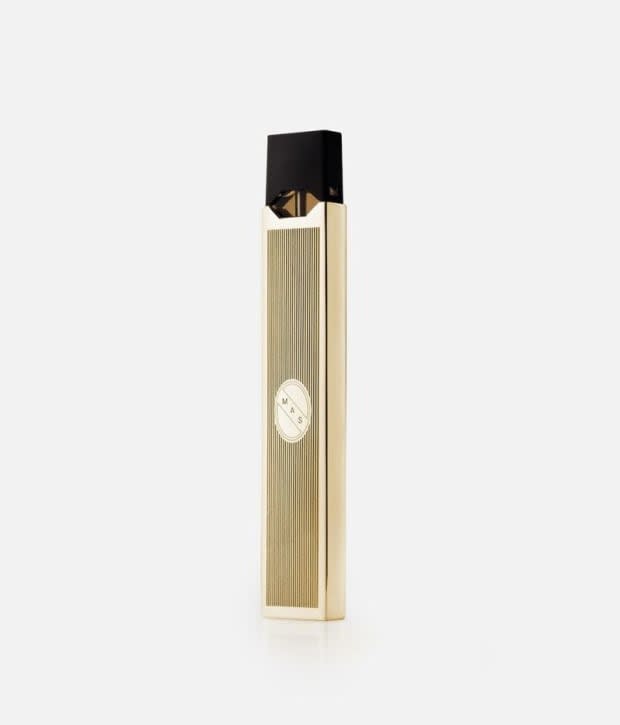
Miansai's Vape Case falls well within the luxury range of Juul accessories. Available in sterling silver or 18-karat solid gold, each case is handmade with the option of a laser-customized monogram. "I love old vintage Cartier lighters that people carried or put on a table and it was a conversation piece," says Founder and Creative Director Michael Saiger. "So I wanted [the Vape Case] to feel very vintage."
Saiger admits that he doesn't smoke, and his idea to create the case stemmed from his circle of friends who use Juuls and e-cigarettes. "I like to do things that are happening or that are relevant," he says. "It's not like I'm looking to go after this market, but it's something that's happening in our culture now. I want to make something that people can use and relate to and say, 'Oh, this is really cool.'"
So far, Miansai's Vape Case is striking a chord among consumers: At press time, four 18-karat-gold cases, which retail for $5,000 each, have been sold, while the sterling silver version, costing $1,000 each, has sold 15 units.
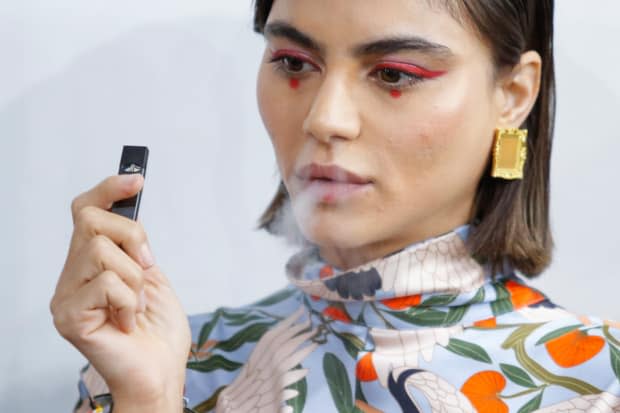
When asked for comment on these Juul-specific fashion items, a Juul Labs spokesperson provided a statement via email: "We do not make, market or endorse these accessories. The Juul system is intended for current adult smokers only who want to switch from combustible cigarettes." The diplomatic response was to be expected, as the $38-billion-dollar brand has been taking extreme steps to position itself away from youth-oriented marketing, social media and underage consumers.
"Every new social development is an excuse for fashion to tell you that you need something new," notes Deihl, using cell phone covers as a prime example. (Last year, the mobile phone accessories market across the globe was valued close to $73 billion.) A report from BIS Research valued the e-cigarette and tobacco-vapor market at an estimated $11.43 billion in 2016 with the potential to grow to over $86 billion by 2025. Compare this to another smoking-related space that's on the brink of its own luxury makeover: The international marijuana market is projected to hit $31.4 billion by 2021, according to a new report from the Brightfield Group.
"You look at a designer like Jeremy Scott and his McDonald's french fries cell phone case [for Moschino]. Countless, millions of them — God knows how many he sold," says Trunzo. "You can imagine how he would design a playful skin for a Juul in that vein. I think we're about to embark on a period where we see a lot of these accessories for sure."
Sign up for our daily newsletter and get the latest industry news in your inbox every day.